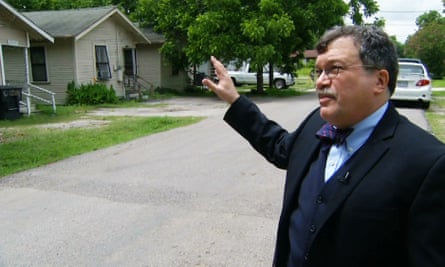Nobel-nominated vaccine expert warns of Covid complacency: ‘We’re still losing too many lives’

"Joe Biden was wrong to declare the coronavirus pandemic over in the US, one of the country’s leading experts on the virus has told the Guardian.
Dr Peter Hotez, co-director of the Center for Vaccine Development at Texas Children’s hospital and dean of the National School of Tropical Medicine at Baylor College of Medicine, said that the US president’s statement in September, that “the pandemic is over”, was mistaken and a poor message to send to the American public.
“Well, it’s certainly not [over],” Hotez said in an interview with the Guardian. “We’re still in 200-300 deaths per day. [Covid-19] is still the third or fourth leading cause of death in the United States. It’s definitely the wrong message to give, given the fact that we’re desperately trying to persuade the American people to take this [bivalent] booster.”
Hotez said that getting the bivalent booster shot is the one of the most important things people can do to protect themselves against Covid. So far, only 14.1% of the total US population above age five has received the bivalent booster shot, according to the Centers for Disease Control.
“For instance, here in Texas, where I’m based, only 7% of Texans have gotten their bivalent [booster].”
Hotez – who is nominated for a Nobel peace prize along with his colleague Dr Maria Elena Bottazzi for their work developing Corbevax, a Covid-19 vaccine they refused to patent so it could be replicated by middle- and lower-income countries – also issued a chilling warning about the future of this pandemic or any others.
“The next big coronavirus pandemic is coming – the fourth one. I can’t tell you if it’s going to be next year or five years or 10 years, but it’s coming,” he warned.
On assessing where the US stands in comparison with other nations now, Hotez was not able to offer any good news.
“I think the US is not doing well. I think we failed to persuade a third of the country to get vaccines at all, maybe a quarter. And of those who’ve gotten two doses, we’re only persuading around a third [of them] to get their booster,” Hotez said. “So the anti-vaxxers have won this victory. We’re still losing too many lives.”
Since the pandemic began, more than 1 million people have died from Covid-19 in the US – the country with the 16th highest mortality rate per 100,000 people. The current weekly average of new cases in the US is 65,067, a slight 2.9% decrease from the previous weekly average of 67,034.
“I call it the greatest self-immolation in American history,” Hotez said. “It’s just so tragic.”
But the US is not alone in its poor Covid response performance rating.
“The US remains vulnerable. Canada, less so. Australia, less so. Maybe European countries, less so. But the US, India and China, of course, are extremely vulnerable, because China is getting vaccines that don’t protect nearly as well against the variants, and the Chinese refuse to afford effective boosters against BA.5 – either our vaccine or the mRNA vaccines,” Hotez said.
China in particular has taken a drastic approach to its pandemic response by implementing a zero-Covid policy that saw extreme lockdowns. A surge in infections led to President Xi Jinping’s strict policy. A harrowing result of that policy was the deaths of 10 people from the far western region of Xinjiang, who perished in a fire that engulfed a high-rise residential building they were unable to escape in time due to the lockdowns last month.
But unprecedented mass protests across the country, especially in cities such as Beijing and Shanghai, demanding the zero-Covid policy’s end and Xi’s resignation, resulted in a policy shift away from such restrictive measures.

That relaxation was a good sign, according to Hotez, who said harsher does not necessarily mean better when it comes to dealing with the virus.
“China has relied primarily on aggressive lockdowns and that is a failed strategy,” he said. “So they have tremendous vulnerability, because its population is immunologically naive and they don’t have the ICU infrastructure to handle a big surge. So they have, I think, the single greatest vulnerability right now.”
He added: “[China] kept it down to very crude and primitive means. They didn’t take advantage of the technology that was available.”
So what lies ahead for the pandemic? In the immediate future, the winter season is a playground for illnesses like the flu, the increasingly common respiratory syncytial virus (RSV) and variants of Covid-19.
“Right now, we’re in a bit of a holding pattern, wanting to know what happens with these new variants,” Hotez said. “In the past, you know, we’ve had these series of catastrophic waves from individual variants. We had the big, horrible Alpha wave in the winter of 2021. In the last half of 2021, we had the Delta wave, and then we had BA. 1, Omicron in early 2022, then BA.212, and then BA.5.”
“We have seen these bumps in Europe and my prediction is we’ll see one in the US this winter. And maybe we’re seeing the beginning of it right now. How bad it’s going to be is hard to know. We still are seeing 200-300 deaths a day, which is a pretty serious, deadly disease. It’s still something far worse than the flu. Maybe not as bad as it has been. But the key is to get Americans to take two or three appropriate protective measures.”
In addition to masking up and continuing to practice good hygiene, Hotez encourages another protective measure: tuning out anti-science conspiracy theories.
“The globalization of anti-vaccine activists is such a deadly force. Because of the far-right members of Congress, and the CPAC [Conservative Political Action Coalition] conference, and Fox News – and now that’s a globalizing force. So anti-science activism and aggression is now, as societal forces, killing more Americans than gun violence or global terrorism.
The wave of Covid-19 misinformation doesn’t just end on US soil.
“Now you’re seeing all the same style anti-vaccine rhetoric in sub-Saharan African countries, south Asia … It’s a deadly force that we still haven’t even begun scratching the surface of combating and countering,” Hotez said.
“That’s why I get so annoyed at all the phoney-baloney Covid origin stories, because it takes our eyes off the prize – that we’re not actually doing the surveillance needed to determine when the next big one’s going to erupt.”
According to Hotez, the key to preventing the next big pandemic can be found within one animal in particular – bats, which can host myriad viruses, from the coronavirus to Ebola.
“We need to have a thorough landscaping exercise of bats across the face of Asia, especially east Asia – going from China into south-east Asia, Cambodia, Japan – where these coronaviruses are, as well as the Middle East and even parts of Latin America,” he said. “The reason why we’re seeing more and more of this is, in part, because of climate change and urbanization – human migrations encroaching into territories where bats are. It’s a combination of climate change with other social determinants.”
All hope is not lost – yet. In order to get ahead of the next pandemic, Hotez said it will also take a combination of the right technological and political infrastructure.
“We have vaccine technologies at an unprecedented level. We have the technology to solve this. What we lack is the political will to empower low- and middle-income countries to really investigate these outbreaks. Modern technology has outpaced our social and political infrastructures. We have the technical support, but we are not willing to implement it,” he said."
No comments:
Post a Comment